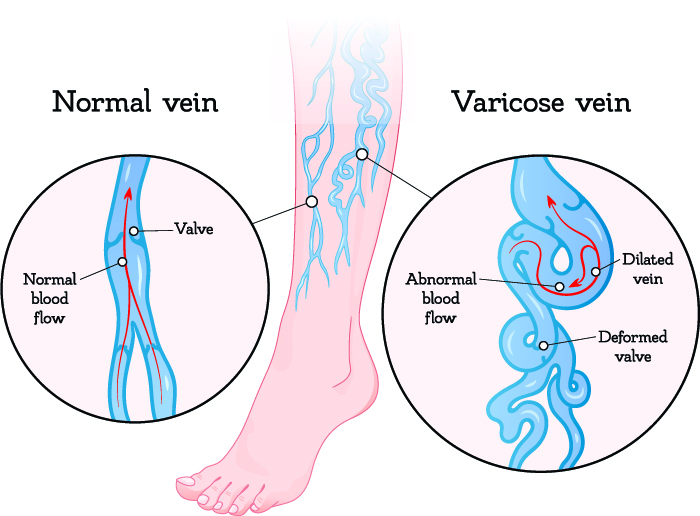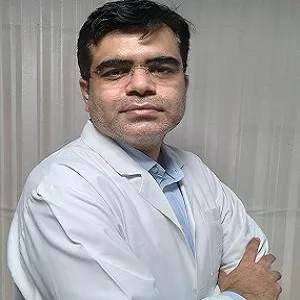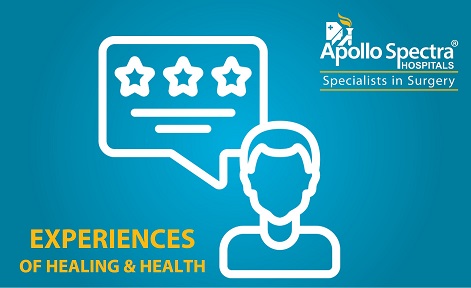Varicose Veins Treatment & Diagnosis in Chunni Ganj, Kanpur
Varicose veins are a common problem, seen in individuals who have faulty blood return in their veins. It is often seen as twisted and bulged veins on the legs. Varicose veins often show no symptoms but if they turn painful, they may require medical attention.
What are varicose veins?
Sometimes, our veins become swollen, tortuous, and twisted and these are called varicose veins. They are commonly seen on calves, with a bluish-purple discolouration. Varicose veins are more common in women than men and in individuals who stand for prolonged periods of time.

What exactly causes varicose veins?
Veins are blood vessels that carry blood back to the heart. For this, they have a door, called valves. If these valves fail to function, the blood flows backwards due to gravity and accumulates in the veins. This makes them swell up and enlarge. The malfunction of valves can be because of many reasons like:
- Prolonged periods of standing
- Pregnancy
- Menopause
- Previous family history
- Older individuals
- Obesity
What are the symptoms of varicose veins?
Most often, varicose veins show visual symptoms.
- Large, twisted, swollen, bluish-purple veins on the legs.
- Pain and heaviness around the veins.
- Burning and throbbing, muscle cramping in the legs.
- Increase in pain and swelling after standing for a long duration.
- Itchiness around the veins.
- Spider veins – these are smaller varicose veins, appearing like a spider web.
When to see a doctor at Apollo Spectra, Kanpur?
Varicose veins are relatively common and as long as they do not affect your everyday activities, it is okay. When they start to pain, itch, or feel heavy, one must book an appointment immediately to meet with the doctor.
Request an appointment at Apollo Spectra Hospitals, Kanpur
Call 1860-500-2244 to book an appointment
How is varicose vein diagnosed?
Diagnosis of varicose veins involves patient history and physical examination. The doctor will most likely ask for symptoms, personal history, and family history before performing a physical examination.
During the physical test, the doctor may ask you to stand while he performs them. Some of the tests are:
- Doppler test: a type of ultrasound test to detect the direction of flow of blood and the presence of obstructions.
- Duplex ultrasound: this scan provides coloured images of the veins which not only helps in identifying blocks but also the speed of blood flow.
What is the treatment for varicose veins?
Varicose veins are usually treated by making changes to one’s lifestyle before opting for a more aggressive form of treatment.
Conservative treatments and lifestyle changes:
- Exercising to improve circulation.
- Reducing body weight to alleviate some pressure.
- Using compression socks and stockings for relief.
- Avoid standing for prolonged periods of time.
- Place feet at a higher level than the heart to allow easy blood flow.
Surgical treatment options:
If the pain is too severe and does not subside with conservative treatments, one can opt for surgical treatments. Some of the surgical treatments for varicose veins at Apollo Spectra, Kanpur are:
- Ligation and stripping: the vein with a defective valve is detected, and is tied up. It is then pulled out from the other side. The procedure is done under anaesthesia.
- Sclerotherapy: a chemical substance is injected into the vein to block it off. Micro sclerotherapy is a similar procedure for smaller veins.
- Endovenous ablation: radio waves and heat are applied to the vein, and this blocks the vein.
- Laser surgery: laser light is used to block the vein.
- Endoscopic vein surgery: a scope is inserted into the vein, and this helps to block the vein off.
Conclusion:
Varicose vein is a common problem, especially among women. That said, care must be taken to make sure it does not progress to become worse. With proper preventative measures, varicose veins can be easily managed without surgery.
If varicose veins are not given proper attention, there might be more complications. There may be severe pain, swelling, rashes, ulcer, bleeding, and blood clots. Make an appointment with your doctor to avoid it.
Exercising is very good for varicose veins, provided they are low impact exercises. Avoid high impact workouts that require jarring motions. Walking is a very good exercise.
Keep your legs elevated for at least 15 minutes or more, several times a day for maximum relief.
Symptoms
Our Doctors
DR. ACHINTYA SHARMA
MBBS, MS,MCh...
| Experience | : | 7 Yeras Experience |
|---|---|---|
| Speciality | : | Vascular Surgery... | Location | : | Chunni Ganj |
| Timings | : | Available by prior a... |
Our Patient Speaks
I wanted to take a moment to express my heartfelt gratitude for the exceptional care and treatment I received during my recent varicose vein surgery. Under Dr. Achintya Sharma's expert guidance and the dedicated efforts of the Apollo Spectra Hospital team, I underwent a successful procedure that has truly transformed my quality of life.
Since the surgery, I have experienced significant relief from the discomfort and symptoms associated with varicose veins. I am now able to engage in daily activities with renewed energy and without the hindrance of pain or swelling. The improvement in my overall well-being is remarkable, and I owe it all to the skillful hands and compassionate care provided by Dr. Sharma and your esteemed hospital.
I am deeply impressed by the professionalism, competence, and kindness exhibited by everyone involved in my treatment journey. From the initial consultation to the post-operative care, every step of the process was marked by excellence and attention to detail.
Thank you, Dr. Achintya Sharma, for your expertise and unwavering commitment to restoring my health. And to the entire Apollo Spectra Hospital team, thank you for creating a supportive and healing environment where patients like myself can receive the best possible care.
Mohit Bulani
Vascular Surgery
Varicose Veins
Our Top Specialities
NOTICE BOARD
CONTACT US
CONTACT US
 Book Appointment
Book Appointment




.svg)
.svg)
.svg)
.svg)








